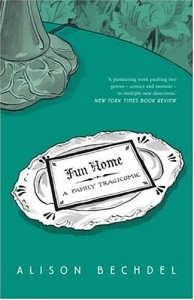 In light of the unprecedented and vindictive budget cut currently making its way through the South Carolina legislature as punishment for the College of Charleston encouraging (but not requiring) students to read Alison Bechdel’s Fun Home, we thought we’d share a quick refresher on the other challenges the award-winning graphic novel has faced over the years.
In light of the unprecedented and vindictive budget cut currently making its way through the South Carolina legislature as punishment for the College of Charleston encouraging (but not requiring) students to read Alison Bechdel’s Fun Home, we thought we’d share a quick refresher on the other challenges the award-winning graphic novel has faced over the years.
Fun Home is a graphic novel memoir of the author’s childhood, particularly focused on her relationship with her closeted gay father Bruce. As Alison grows older and realizes that she is a lesbian, she and Bruce are both forced to confront how his repression may have affected her own self-image and the way that she dealt with her sexuality. Loaded with literary references and appropriately gothic-tinged (“fun home” is the Bechdel children’s abbreviation for the funeral home that their family owns), the book was included on numerous “best of the year” lists, including Publishers Weekly, Time, Amazon.com, and The New York Times. It was also a finalist for a National Book Critics Circle Award (memoir/autobiography category) and won an Eisner Award (best reality-based work), the Stonewall Book Award (non-fiction), the GLAAD Media Award (outstanding comic book), and the Lambda Literary Award (lesbian memoir and biography).
Although book challenges and bans at the college level are exceedingly rare, Fun Home now has the distinction of being at the center of two post-secondary dustups. In 2008, a University of Utah student objected when she was assigned to read the book for an English class. The student was offered and accepted an alternate assignment in accordance with the university’s religious accommodation policy, but she also notified a Salt Lake City group called No More Pornography. That organization — which appears to be long-defunct as of 2014 — contacted local media and started an online petition urging the university to stop “pornography being used as a teaching tool.” The petition never reached its goal of 250 signatures, and in any case University of Utah administrators stood behind the book and told news station KSL TV that they had no plans to make any curriculum changes because “while a student has the right not to read the book, other students in the class have the right to judge for themselves.”
If some South Carolina legislators get their way, College of Charleston faculty and administrators may not be accorded the same freedom to make curricular decisions without outside interference. The current controversy began last July, when the family of an incoming CofC freshman contacted the conservative Palmetto Family Council about the school’s choice of Fun Home for its summer reading program called “The College Reads.” Apparently sensing an opportunity, PFC issued a hyperbolic blog post about “a shocking summer reading assignment” and followed it up a few weeks later with another claiming that the book was “so explicit that if [it] were classified as a movie it would be rated NC-17.” (The logic behind MPAA ratings is a whole other can of worms, but this is likely untrue since no genitalia are visible in the few panels depicting sexual activity.)
Despite PFC’s agitation, the College of Charleston stood behind Fun Home, pointing out that participation in the College Reads program was entirely voluntary. The manufactured controversy seemed to die down — until last month, when state Rep. Garry Smith proposed cutting CofC’s budget by $52,000, the exact cost of the annual reading program and associated events. Ignoring all principles of academic freedom for public colleges, a majority of House members approved the state budget bill that includes the punitive cut on March 10. The Senate has yet to debate or vote on the bill, but will do so sometime in the next few weeks. (CBLDF joined a coalition in sending a letter urging the Senate to restore the funding.)
Fun Home also faced a notable challenge shortly after its publication in 2006, when a resident of Marshall, Missouri, requested that it be removed from the local public library along with another graphic novel, Blankets by Craig Thompson, because children might be drawn to the format. At a library board meeting, another resident even went so far as to claim that the books could result in “seedy people coming into the library and moving into our community.” The Marshall Public Library temporarily withheld Fun Home and Blankets from circulation while it drafted a materials selection policy, but returned the books to shelves in 2007 once the policy was in place.
We need your help to keep fighting for the right to read! Help support CBLDF’s important First Amendment work by visiting the Rewards Zone, making a donation, or becoming a member of CBLDF!
Contributing Editor Maren Williams is a reference librarian who enjoys free speech and rescue dogs.